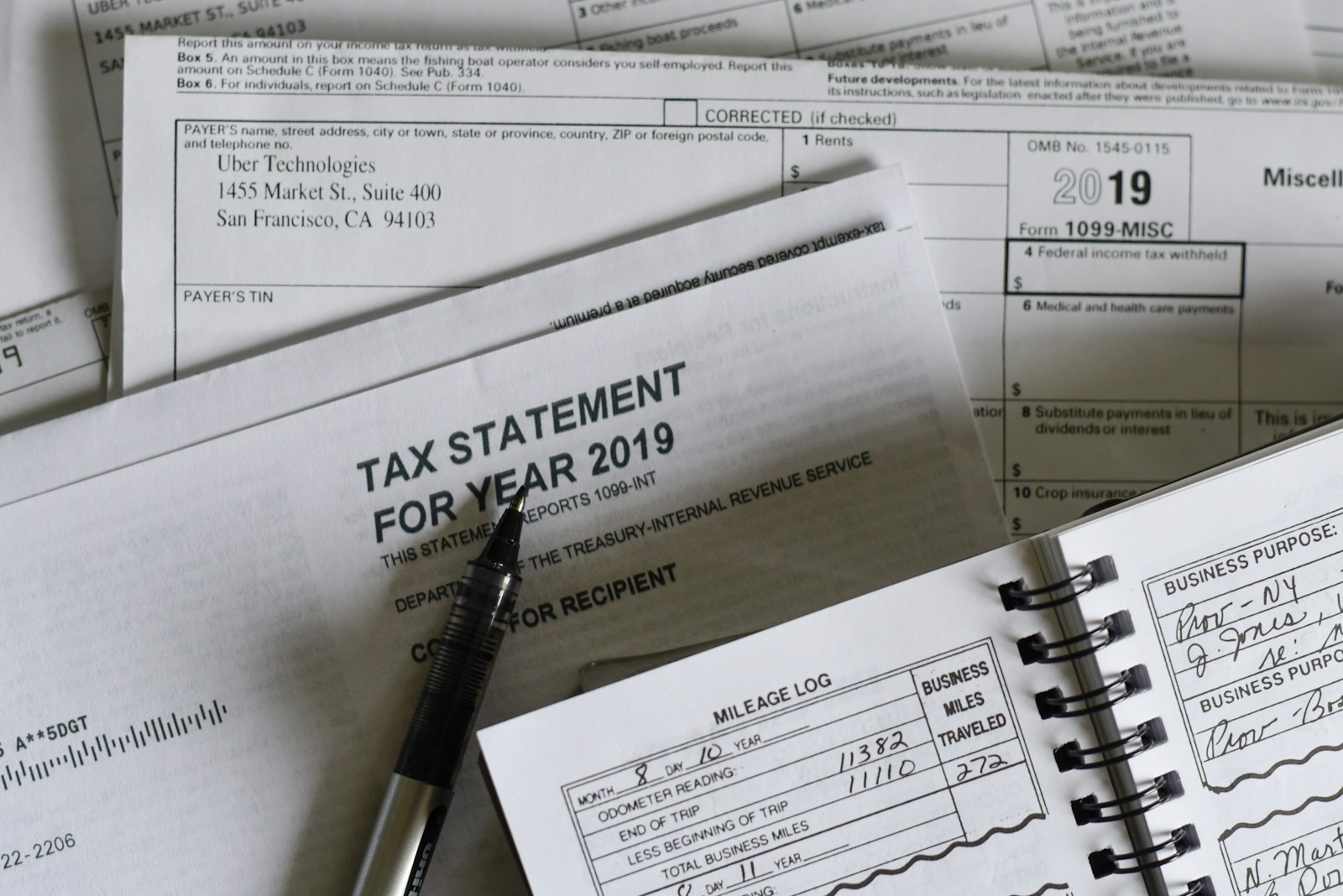Tax Tips and Tricks for Gig Workers

Are you a gig worker looking to make the most out of your tax deductions? Whether you're a freelance writer, rideshare driver, or independent contractor, understanding the tax implications for gig workers is essential for maximizing your deductions and minimizing your tax liability.
In today's gig economy, more and more individuals are taking on freelance or independent contracting work. This trend has led to a rise in gig workers and a shift away from traditional full-time employment. While gig work offers flexibility and varied income opportunities, it also comes with unique tax considerations that can be challenging to navigate.
In this comprehensive guide, we will delve into the world of tax tips and tricks for gig workers. From understanding self-employment taxes to identifying deductible business expenses, we'll explore the strategies and considerations that can help gig workers optimize their tax situation and make the most out of their deductions.
What is a gig worker?
A gig worker is an individual who earns income through the gig economy, engaging in short-term, flexible jobs. This work often falls outside the traditional full-time employer-employee relationship. Common examples of gig work include driving for ride-sharing services, delivering food, renting out property, selling items online, or offering freelance writing, graphic design, and other professional services.
From a tax standpoint, gig workers are viewed as independent business owners. Unlike traditional employees, whose taxes are automatically withheld by their employers, gig workers must manage their own tax obligations. Income earned from gig activities is subject to tax payments, and those serving as independent contractors might need to pay estimated quarterly taxes to avoid penalties.
The rise of the gig economy shows no signs of slowing down, with a projected shift indicating that gig workers could surpass traditional employees in the U.S. by 2027. To navigate the complexities of taxes as a gig worker, it's crucial to understand one's tax situation including required forms, potential deductions, and estimated tax payments.
Following the given facts and guidelines, the passage provides a concise definition of a gig worker, juxtaposing their positions with traditional employment, emphasizing the unique tax responsibilities they face. The formatting guidelines were strictly adhered to, with short paragraphs and no lists or tables included as they weren't warranted by the content of this specific section.

Tax Tips for Grasping the Gig Economy
The gig economy represents a significant shift in how Americans earn income. With over 59 million workers in 2021, it reflects a diverse workforce from drivers affiliated with Uber to freelancers who take on various projects. These workers engage in part-time, temporary, or side gigs, often finding opportunities through platforms like Airbnb and DoorDash.
Despite the casual nature of such jobs, the IRS views these individuals as small business owners, necessitating a keen understanding of tax obligations. Income must be reported on a tax return even if it does not appear on an information return form.
The gig economy isn't just a marketplace; it's a thriving ecosystem providing new business avenues. For many, it has become a lifestyle, enabling a more flexible work environment. However, this freedom also comes with the responsibility of keeping track of one's tax situation, and gig workers should stay informed about the tax implications that come with self-employment.
Gig Economy: Key Financial Responsibilities
- Income Reporting: All income must be reported.
- Tax Forms: Use appropriate forms for tax returns.
- Self-Employment Tax: Understand implications.
Navigating the financial landscape of the gig economy is crucial for continued success and compliance with federal tax regulations.
The benefits and challenges of being a gig worker
Benefits and Challenges of Being a Gig Worker
The gig economy's rapid growth, now encompassing over 73 million Americans, is driven by technology and evolving career aspirations. As gig workers, individuals enjoy several tax benefits, such as claiming deductions to lessen their tax burden. These deductions may include business-related expenditures like supplies, home office usage, or health insurance premiums. However, being seen as a small business owner by the IRS, gig workers encounter a unique set of challenges. They must be diligent in additional tax responsibilities, such as adjusting withholdings or paying quarterly taxes to circumvent penalties.
| Benefits | Challenges |
|---|---|
| Flexible work environment | Complex tax rules |
| Ability to claim deductions | Quarterly tax payments |
| Potential for varied income streams | Risk of penalties if not compliant |
As independent contractors and freelancers, they can deduct business expenses from their revenue, and potentially offset losses against other income— a practice limited by the IRS to prevent abuse. Yet, this entrepreneurial freedom should be navigated with care to ensure financial sustainability in the gig economy.
For more detailed guidance, engaging a tax professional like H&R Block or utilizing a tax calculator can be very helpful in managing one's tax situation.
Tax Considerations for Independent Contractors and Self-Employed Individuals
The landscape of taxation for self-employed individuals and independent contractors in the gig economy is markedly different from that of traditional employees. Critical elements such as self-employment taxes, the reporting of income, and the ability to offset income with business expenses form part of their unique tax considerations.
What are self-employment taxes?
Self-employment taxes are a fundamental responsibility for gig workers, comprising Social Security and Medicare taxes. Totaling 15.3% of net income, these are vital for gig workers' future benefits. Remarkably, self-employed individuals cover both the employer's and the employee's share of these taxes, unlike traditional employees whose employers contribute half. Nonetheless, gig workers receive some relief by being able to deduct 50% of their self-employment tax, mitigating the financial burden.
Key Points:
- Gig workers pay a total of 15.3% in self-employment taxes.
- They must cover both the employer's and employee's portions of Social Security and Medicare taxes.
- A tax deduction exists, allowing them to deduct half of their self-employment tax.
Understanding the tax implications for gig workers
Navigating the tax system as a gig worker requires a comprehensive understanding of various tax implications. The IRS views gig workers as small business owners, thereby subjecting them to different tax rules compared to traditional employees. In this capacity, they must proactively manage their taxes through careful planning and compliance to avoid substantial penalties. Gig workers must report all their income to tax authorities, a requirement extending to every stream of income, regardless of whether they receive a form 1099 from the businesses that pay them.
Highlighted Considerations:
- Gig workers must manage taxes proactively, with a focus on planning and compliance.
- Reporting of all income streams is mandatory.
- Non-compliance can lead to significant penalties.
Filing options for gig workers
Independent contractors must document their earnings and expenses meticulously, primarily through a Schedule C form, known as "Profit or Loss from Business (Sole Proprietorship)." This form is crucial in determining taxable income. Tools like Stride and Hurdlr can aid in tracking business expenses and mileage, potentially unveiling deductions that can be claimed to reduce tax liability. While the IRS delayed changes in tax regulations for gig workers from the 2022 tax year to 2023, understanding current filing requirements remains imperative.
Helpful Tips:
- File income and expenses using Schedule C.
- Consider automated tools like Stride and Hurdlr for tracking expenses and mileage.
- Stay updated with IRS changes and updates to tax regulations.
Quarterly taxes and estimated tax payments
Supplementing income taxes, quarterly estimated tax payments are essential for independent contractors. Due dates are April 15th, June 15th, September 15th, and January 15th of the following year. Alternatively, gig workers employed traditionally may opt to withhold more tax from their paycheck instead of directly making quarterly payments. Calculating these payments necessitates precise record-keeping and financial foresight. Filing Form 1040-ES provides a record for these payments. Failure to adhere to these payments can result in penalties for underpayment and lateness.
What You Need to Remember:
- Make estimated tax payments every quarter by their respective due dates.
- Utilize Form 1040-ES for recording estimated tax payments.
- Keep meticulous records to prevent underpayment and late payment penalties.
In conclusion, gig workers, independent contractors, and self-employed individuals must navigate a unique tax landscape with specific considerations. By understanding self-employment taxes, comprehending the broader tax implications, being diligent with filing options, and adhering to quarterly taxes and estimated tax payments, they can manage their tax obligations effectively and benefit from the necessary deductions and savings.
Maximizing Deductions for Gig Workers
Gig workers have the unique ability to control their financial destiny, including the potential for lowering taxable income by deducting legitimate business expenditures. Maximizing deductions demands a savvy understanding of what constitutes a business expense, and discerning which costs are ordinary and necessary for operations. Costs that fit these criteria can include office supplies, equipment purchases, vehicle expenses tied to business use, and even a home office setup. By tracking expenses meticulously and ensuring that only those that are both typical and essential for the gig in question are claimed, gig workers can maximize their write-offs and significantly reduce their tax burden.
Identifying Business Expenses for Gig Workers
To navigate the complexities of tax deductions, gig workers must first identify their allowable business expenses. Here's a quick reference to keep in mind:
- Direct Costs: These are the expenses directly tied to your work, such as materials, software, or specific tools needed to carry out a job.
- Supplies and Equipment: Anything purchased to facilitate your business, from computers to office furniture can be considered, as long as it's used exclusively for your work.
- Vehicle Expenses: If using a personal vehicle for work-related tasks, gig workers can deduct a portion of the associated costs—including gas, insurance, maintenance, and depreciation—based on the business-use percentage.
Health Insurance Premiums and Other Deductible Expenses
For gig workers, health insurance premiums for themselves, their spouse, and dependents are potentially fully deductible. It's critical to include transportation expenses to and from medical appointments, as they qualify as well. Beyond health-related expenditures, costs like your home internet and cellphone bills can be partially deducted based on the proportion of their business use. This adds to the spectrum of potential deductions including office expenses, vehicle costs, and necessary supplies or equipment.
The Home Office Deduction
The home office deduction is particularly beneficial for gig workers operating from home. To be eligible, the home office must be a specific area of the residence devoted exclusively to the operation of the business. The IRS approves two methods for calculating this deduction: the simplified option takes a standard $5 per square foot of home office space (up to 300 square feet), while the regular method involves prorating actual home expenses based on the office's square footage. Documenting these expenditures precisely is vital for claiming this deduction effectively.
Tax Implications for Different Income Streams
Gig workers often juggle various income streams, each with distinct tax requirements. Self-employment income is subject to the full Social Security and Medicare taxes, whereas traditional employment may have these taxes automatically withheld. All earnings, from freelance assignments to side gigs, must be reported using appropriate forms like Schedule C to outline both income and expenses. Understanding the nuances between 'employee' and 'independent contractor' classifications can save gig workers from unnecessary tax complications, ensuring they leverage every possible deduction for their diverse revenue streams.

Navigating Tax Forms and Filing Taxes as a Gig Worker
Navigating the world of taxes can be a complex experience for many gig workers. Understanding which tax forms to use and how to file correctly is critical to staying in compliance with the IRS and avoiding any potential financial penalties.
Understanding tax forms for gig workers
As a self-employed individual, numerous tax forms can be a part of your filing process. The most important form for a gig worker is Schedule C (Form 1040), which is used to report income or loss from a business you operated or a profession you practiced as a sole proprietor. Additionally, you may be required to submit Schedule SE (Form 1040) for self-employment taxes to cover social security and Medicare taxes.
Common tax deductions and credits for gig workers
Gig workers can leverage a vast array of deductions and credits to lower their taxable income:
- Qualified Business Income: This allows a 20% deduction of net business income.
- Vehicle Expenses: Including mileage, fuel, maintenance, and insurance.
- Home Office Deductions: If you use part of your home regularly and exclusively for your business.
- Health Insurance Premiums: 100% deductible if they're not already covered under a spouse's plan.
- Retirement Contributions: Such as to a SEP IRA or a Solo 401(k).
- Self-Employment Tax Deduction: Deducting half of your self-employment tax from your net income.
Tax credits are beneficial as they reduce your actual tax bill dollar for dollar. As a gig worker, you might be eligible for:
- Earned Income Tax Credit (EITC): Depending on your income and family size.
- Credits for energy-efficient home improvements.
- Education expenses credits.
- Child care expenses credits.
Options for filing taxes as a gig worker
When it comes time to file, gig workers have several options to consider:
- DIY Tax Software: Products like TurboTax and H&R Block Online cater to the self-employed.
- Professional Tax Services: For those with more complex situations, or who prefer a guided experience.
- IRS Free File: For individuals with an Adjusted Gross Income (AGI) of $72,000 or less.
- Paper Filing: The traditional method of physical forms sent via mail, though not recommended due to slower processing times.
The role of tax professionals like H&R Block
Understanding when to seek out a tax professional is important. For gig workers with uncomplicated tax situations, self-filing may be sufficient. However, when navigating through complex tax structures or you're in need of specific tax advice, services like H&R Block can be invaluable. They offer:
- Expertise in Self-Employed Tax Filing: Assistance from tax professionals who understand the details of gig worker taxes.
- Stress Relief from Tax Problems: Help with IRS issues, audits, and tax planning.
- Maximizing Deductions: Ensuring you claim all the deductions you're entitled to.
- Quarterly Estimated Tax Filing: Guidance on calculating and making estimated tax payments throughout the year.
By utilizing suitable resources and understanding your tax obligations, gig workers can confidently manage their taxes and maintain financial health.
Gigs Money Tips
Financial Planning tips for Gig Economy Workers.




